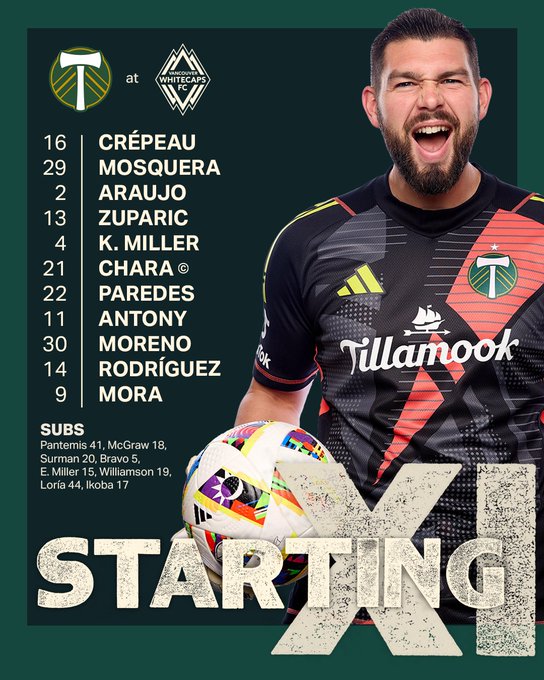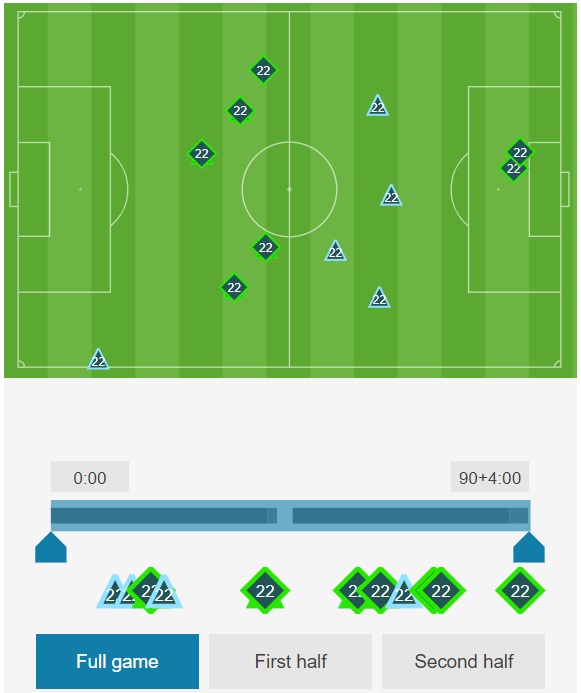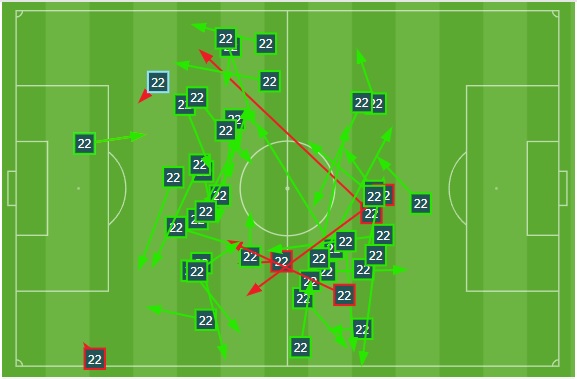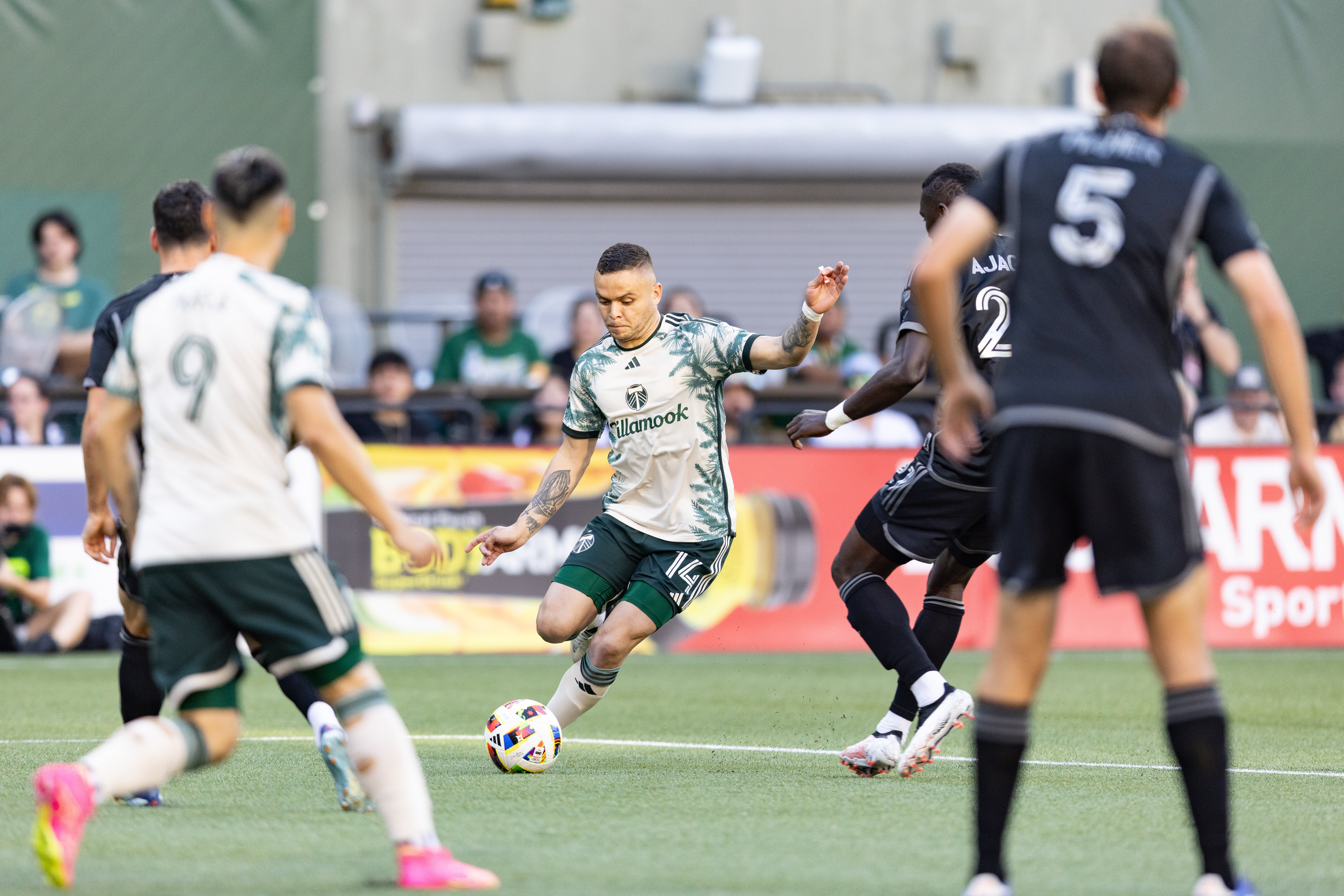With the Cascadia Cup at stake, the Portland Timbers drew with the Vancouver Whitecaps on Saturday. Jonathan Rodríguez was the lone goalscorer for the visitors.
The lineup
Portland’s most noticeable absence was. of course, Evander, who missed the match due to yellow card accumulation.
Dario Župarić started in the centerback position along with Miguel Araujo, while Claudio Bravo was benched. Kamal Miller started on the left, with Juan David Mosquera in the right-back position. In the midfield, David Ayala wasn’t available, and Eryk Williamson was benched so, coach Phil Neville decided to start Cristhian Paredes and Diego Chará. Antony, Rodríguez, and Felipe Mora were the attackers, with the Brazilian going through the right and the Uruguayan on the left.

Maybe the greatest challenge for the Timbers in this game was to see if they could create magical moments and get a good result without their most valuable player.
The expected goals
In the game against Real Salt Lake, the Timbers overperformed and beat their expected goal probability. In this match? Not so much. Even though they had more shots (11 to Vancouver’s nine) and shots on target (four to the Whitecaps’ three), it was Vancouver who had a better probability of scoring (0.51 Timbers to 0.98 for Vancouver).
The Timbers actually were lucky to have drawn a point away from home. Rodríguez’s first goal was disallowed due to offside, and two different Vancouver players barely missed their shots when they hit the post.
Portland had a hard time creating looks without their playmaker Evander. In the absence of the Brazilian, Santiago Moreno assumed some of Evander’s responsibilities, but Moreno is simply not an MLS MVP candidate. However, he was able to do enough to help his side rescue a point.
The goal and the protagonists
Vancouver infringed some damage, with Sebastian Berhalter sending crosses from the Timbers’ left side. That’s how their goal came. It’s never good to see Portland concede first, but the scenario was made worse by the fact that they did so only three minutes into the match. It is as if Portland went back to catch those bad habits they left at the beginning of the season, and they can’t shake them off now. Well, you know what they say: “Old habits die hard.”
Portland hit the snooze button when the referee blew the first whistle of this game and stayed like that for the first 20 minutes, until they finally decided to start playing. Up until then, what they showed was a very poor performance.
After a subpar opening, the dynamic changed. The two balls Moreno put up for Rodríguez were superb. Too bad the Uruguayan was offside in the first goal; a cross from the right all the way to the far post and a one-touch finish would’ve made for a great goal.
The forward didn’t agree with the offside call, but he didn’t have much time to lament because only one minute later, Moreno sent another great pass to him—this time from the middle of the park—and Rodríguez was able to put it past the goalkeeper.
Getting the equalizer before halftime was important. Despite not being the goal scorer, Araujo also did excellent carrying that ball to the middle of the park, showing his dribbling skills in the process.
However, there was another player who did a lot for this team in the first half: Mosquera. The defender was everywhere, intercepting balls, adding himself to the attack, sending dangerous crosses, creating chances. He ran out of gas in the second half, but the man showed up when needed.
Of course, Paredes also put out a well-rounded performance. During the last couple of months, he has taken a more secondary part in this squad, but the midfielder put on a great shift when he was given the opportunity.
If you look at the graphic below, you can see some of Paredes’ individual game actions. Green triangles are tackles won, recoveries are in blue. Duels are represented with green diamonds.

Paredes was also good in the passing accuracy department, connecting 88.1% of his passes. Only Chará did better with 95%.

Cascadia Cup
In this game, not only was securing a playoff spot was on the line but also the Cascadia Cup. Portland didn’t do themselves a favor by getting a draw against Vancouver, but what are you going to do, right?
The good thing is that if the Seattle Sounders beat Vancouver by at least one goal, Portland will still have their destiny in their own hands when they meet Seattle in the last game of the season.
That Oct. 19 matchup will undoubtedly be a day to remember—and an exciting one. Hopefully, the Timbers will have secured their playoff spot by then. Right now they’re on the verge of dropping out of playoffs altogether if they continue losing points. The good thing is their next two games—against Austin and FC Dallas— are winnable; the bad thing is Portland should’ve also won against Vancouver.
The difference? These next matches are going to be played at home.

